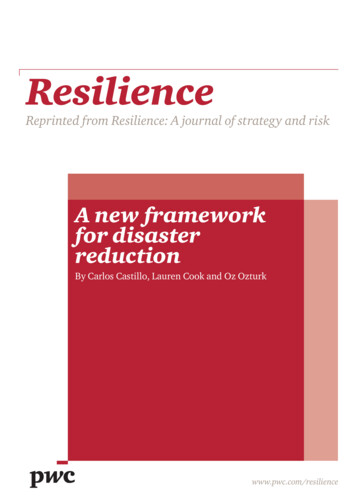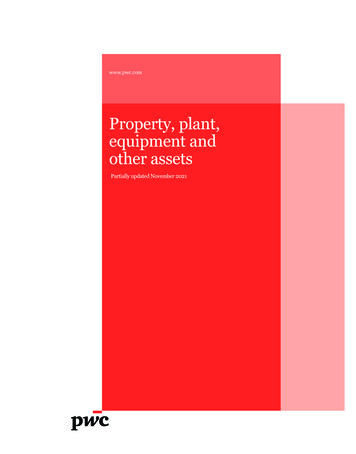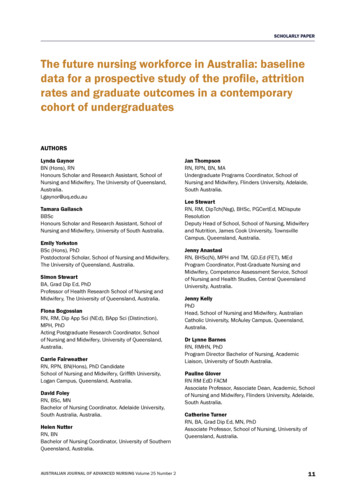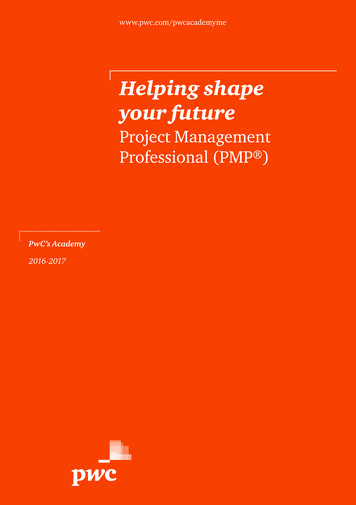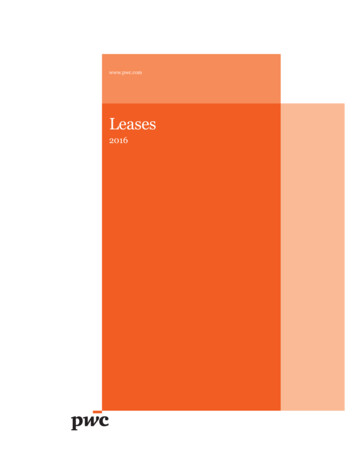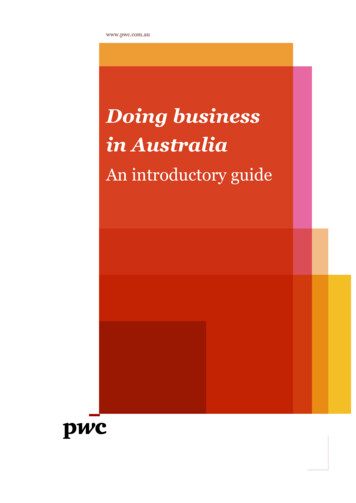
Transcription
www.pwc.com.auDoing businessin AustraliaAn introductory guide
ContentsContentsContentsi1Introducing Australia12Foreign investment in Australia63Structure of business entities104Australian Securities Exchange (ASX)145Visa and immigration for business176Corporate tax217Goods and Services Tax (GST)268Personal tax299Overview of Australian employment law3210Intellectual property3811Consumer law4112Anti-trust and competition law4313Environmental law in Australia4514About PwC48
Introducing Australia
Size and populationA multicultural communityAustralia is the world’s sixth largest country, comprising anarea of approximately 7.7 million square kilometres. It is avast continent covering a distance of approximately 3,700kilometres from its most northerly point to its most southerlypoint and is almost 4,000 kilometres wide from east to west.Inhabited by Indigenous Australians and later settled as aBritish penal colony in the 18th century, Australia is anincreasingly diverse, multicultural nation. Collectively over 200different languages and dialects are spoken including over 50indigenous languages. Australia is home to people from morethan 200 countries and has an enviable internationalreputation for diversity.Australia is comprised of six states and two territories: the Australian Capital Territory, which includes Canberra,the political capital of Australia New South Wales in which Australia’s largest city Sydney,is located Northern Territory Queensland South Australia Tasmania Victoria Western Australia.In 2013, Australia’s total population exceeded23 million people.The Australian lifestyleAustralia is a harmonious community which has benefitedfrom an active program of immigration over the last 50 years.As at 30 June 2010, approximately 1 in every 4 residents wasborn overseas. Of those born overseas, 40 per cent were born inEurope and 33 per cent in Asia.2Certainty and securityThe Australian legal system is a mixture of common law andstatute, similar to the legal systems in the United Kingdom,other Commonwealth countries and some European countries.The common law tradition which applies in Australia expectsand values judicial independence. Decisions of the courtsconform to due process and are made in the context ofprevailing law. Contractual arrangements are thereforeprotected by the rule of law and the independence of thejudiciary. Domestic companies, foreign companies andindividuals have the same standing before the law.Australia has one of the world’s best lifestyles with lifeexpectancy at 84.2 years for females and 79.7 years for males.With the low cost of living, affordable quality housing,extensive healthcare benefits and one of the best educationand social systems in the world, Australia has much to offerexpatriates and their families. Surveys of world citiesconsistently rate Australia’s major cities as offering a greatlifestyle.1Regulatory frameworkResources and climateExchange rate control has effectively been abolished. TheReserve Bank of Australia (Reserve Bank) has effectivelysuspended most of the provisions of the Banking (ForeignExchange) Regulations 1959 (Regulations) (in force under theBanking Act 1959) through granting general authority andexemptions. While the terms of the Regulations ought to stillbe considered on a case by case basis to avoid potentialexposure, they apply in very few cases.An industrialised continent, Australia is blessed with anabundance of mineral and agricultural resources and arguablythe best climate in the world. Australia is located in thesouthern hemisphere, therefore summer is in the months ofDecember to February while winter is in the months of June toAugust. In Australia’s north, summer is hot with rain fromNovember to March. Elsewhere, the average temperature is28 C in January and dry. In the southern states, winter is mildwith an average temperature in July of 16 C.12010 Worldwide Quality of Living Surveyby Mercer Human Resource ConsultingDoing business in Australia An introductory guideThe Australian government (Government) recognises theneed for a regulatory framework to keep pace with financialmarket developments. In 2001 the Government completeda major reform of Australia’s Corporations law aimed atstreamlining regulation while maintaining market integrityand investor protection.2 Australian Bureau of Statistics4
The Australian economyAustralia has one of the strongest, most competitive, openand flexible economies in the world.In 2009, the standard of living in Australia surpassed thatof France, Germany, Italy, Japan, Russia and the UnitedKingdom.3Australia’s economy has grown (on average) by approximately3.3 per cent per annum since 1990. In 2012 - 2013, the GrossDomestic Product of Australia was approximatelyAU 1,525 million.Australia’s corporate tax rate of 30 per cent is verycompetitive when compared with other major economies,with higher company income tax rates applying in theUnited States, China, Japan, Germany, France and India.Australia is a leading financial centre in the Asia Pacific region.The Australian Securities Exchange is among the 10 largestlisted exchanges in the world with a market capitalisation ofAU 1.5 trillion. Australia’s alliance with markets throughoutthe region is increasingly providing business people with acomprehensive range of financial services in the Asia Pacificregion.6Australia’s strong economic growth has been coupled withlow inflation. Over the last 15 years, the inflation rate hasbeen stable, at an average of 2.5 per cent over the period.Australia offers real cost advantages for every category ofbusiness needs from prime central business district officespace, metropolitan factory space and industrial land, totransport infrastructure and low-cost utilities.The unemployment rate in Australia was 5.7 per cent in October2013.There is a strong and enduring tradition of democracy inAustralia where rule of law and regulatory frameworks prevail.Australia is one of the largest economies in the Asia Pacificregion after Japan, China and Korea. China is Australia’slargest trading partner.The work forceAustralia’s time zone spans the close of business in theUSA and the opening of business in Europe.4A good place to do businessMultinational companies view Australia as presenting the bestbusiness case for regional headquarters to target the dynamicAsia Pacific region.Key business centres in Australia include Sydney (New SouthWales), Melbourne (Victoria), Brisbane (Queensland) and Perth(Western Australia). Office space costs in Australia’s businesscentres are low relative to major business centres with Sydneybeing the highest ranked at 14th.5 Australia’stelecommunications costs are among the lowest in the region.3Australia continues to offer a multilingual, highly educatedand skilled workforce. Australia has a comprehensiveeducation and training system with around 50 per cent ofAustralia’s work force having some form of tertiaryqualification. Australians also possess a diversity oflanguage skills with approximately 15 per cent of thepopulation speaking a language other than English.7Education in AustraliaAustralia offers one of the best education systems in theworld. With a 99 per cent literacy rate, Australia is able toprovide a highly educated, skilled and computer literatelabour force to investors6 World Stock Exchanges, and www.asx.com.auOrganisation for Economic Cooperation and Development4 Axiss Australia, Australia: The new centre of global finance7 Axiss Australia, Australia: The new centre of global finance5 DTZ - The Global Office Occupancy Costs Survey 2011Doing business in Australia An introductory guide5
Foreign investment inAustralia
Foreign investment - AnintroductionInvestments requiringprior approvalThe Government welcomes and encourages foreign investmentconsistent with community interests. Australia’s screeningprocess for foreign investment is transparent and very liberal.The Government has the power to block proposals that arerequired to be notified and which are determined to becontrary to the national interest.Types of investment proposals which are subject to the FATAor the Foreign Investment Policy and which require FIRBapproval are:The Foreign Investment Review Board (FIRB) is a nonstatutory body that examines proposals by foreign persons toundertake direct investment in Australia and makesrecommendations to the Government on whether thoseproposals are suitable for approval under the Government’sForeign Investment Policy and whether they are in compliancewith the Foreign Acquisitions and Takeovers Act 1975 (Cth)(FATA).FIRB also provides information on Australia’s foreigninvestment policy guidelines and, where necessary, providesguidance to foreign investors to ensure compliance with theGovernment’s policy. the acquisition of shares or rights to issued shares (whichincludes options, convertible notes and other instrumentswhich may be converted to shares) representing asubstantial interest in an Australian corporation valued atmore than 248 million. For New Zealand and USinvestors, different exemption thresholds apply, namely 248 million for investments in prescribed sensitivesectors, or 1,078 million in any other case8 the acquisition of assets resulting in control of anAustralian business valued at more than 248 million.The thresholds for New Zealand and US investors are thesame as for the acquisition of shares referred to above takeovers of offshore companies whose Australiansubsidiaries or gross assets exceed 248 million. For NewZealand and US investors, the 1,078 million thresholdreferred to above applies, except for offshore takeoversinvolving prescribed sensitive sectors where the 248million threshold applies direct investments by foreign governments or theiragencies irrespective of size the acquisition of interests in Australian real estate(including interests that arise via leases, financing andprofit sharing arrangements) that involve:Foreign personsAustralia’s foreign investment legislation and policy applies toinvestment proposals by foreign persons. A foreign person isdefined as: a natural person, not ordinarily resident in Australia a corporation in which a natural person not ordinarilyresident in Australia or a foreign corporation holds asubstantial interest a corporation in which two or more persons, each of whomis either a natural person not ordinarily resident inAustralia or a foreign corporation, holds an aggregatesubstantial interestthe trustee of a trust estate in which a natural person notordinarily resident in Australia or a foreign corporationholds a substantial interestthe trustee of a trust estate in which two or more persons,each of whom is either a natural person not ordinarilyresident in Australia or a foreign corporation, hold anaggregate substantial interest.Substantial foreign interestA substantial foreign interest exists where a single foreignperson (and any associates) holds 15 per cent or more of theownership or voting rights of any corporation’s business or trustor where several foreign persons (and any associates) hold 40per cent or more in aggregate of the ownership or voting rightsof any corporation, business or trust.Doing business in Australia An introductory guide-developed non-residential commercial real estate,where the property is subject to heritage listing, isvalued at 5 million or more and the acquirer isnot a US [or New Zealand] investor-developed non-residential commercial real estate,where the property is not subject to heritagelisting and is valued at 54 million or more( 1,078 million for New Zealand and USinvestors)-vacant non-residential land (irrespective of value)- residential real estate (irrespective of value)-shares or units in Australian urban landcorporations or trust estates (irrespective of value)-proposals where any doubt exists as to whetherthey are notifiable, (funding arrangements thatinclude debt instruments having quasi-equity-characteristics will be treated as direct foreigninvestment).8 Thefigures quoted are subject to annual indexing and werecurrent as at 30 November 20137
Sensitive sectorsReal estateRestrictions apply in more sensitive industry sectors which reflectcommunity concerns and matters which are contrary to thenational interest. Specific restrictions on foreign investmentapply in sectors such as residential real estate, banking, media,telecommunications, shipping, civil aviation and airports.Normally, these categories include sectors where othergovernment departments or interested parties would be involvedin the screening process or have major carriage of the assessmentof the application.The Australian government has a specific policy in relation toresidential and commercial real estate. Unless a proposedacquisition of real estate falls within an exempt class, theforeign person is required to notify FIRB of any suchinvestment proposal.Australia – United States FreeTrade Agreement (AUSFTA)AUSFTA came into force on 1 January 2005, and is seen asthe most important bilateral economic agreement everundertaken by Australia. For the purposes of foreigninvestment in Australia, a US investor is a: national or permanent resident of the US US enterprise branch (of an entity which is itself not a US enterprise)located in the US and carrying on business there.As stated above, different monetary thresholds apply toUS investors in respect of investment proposals in Australia.For US investors subject to AUSFTA, there are certainprescribed sensitive sectors in which special Governmentguidelines and scrutiny apply to proposed investments.These sensitive sectors are: media telecommunications transport (including airports, port facilities, railinfrastructure, international and domestic aviation andshipping services provided within, or to and from, Australia) the supply of training or human resources, or themanufacture or supply of military goods, equipment ortechnology to the Australian Defence Force or other defenceforces Residential real estateResidential real estate means residential land and housing,excluding commercial and rural properties. Acquisitions ofresidential real estate requiring notification include (subject toeligibility requirements): single blocks of vacant land new dwellings established (second hand) dwellings redevelopment of established (second hand) dwellings.Commercial real estateCommercial real estate includes vacant and developedproperty which is not for residential purposes. It may includerural property that is not used wholly and exclusively forcarrying on a substantial business of primary production.Commercial real estate acquisitions requiring notificationinclude (also subject to eligibility requirements): developed commercial property vacant land mining tenements forestry.Approval processThe Australian Treasurer authorises FIRB to make determinationson foreign investment proposals which are consistent with theForeign Investment Policy and do not involve any sensitive issues(mostly proposals involving real estate).Proposals are examined to see whether they conform with thethe manufacture or supply of goods, equipment or technology requirements of the Foreign Investment Policy and the FATA.Whilst the majority of proposals are approved, the Treasurer hasable to be used for a military purposethe power under the FATA to prohibit proposals that are contrary tothe development, manufacture or supply of, or the provision the national interest or to impose conditions on the approval.9of services relating to, encryption and security technologiesIn most cases, approval is granted within 30 days of receiving aand communication systemsstatutory notice (with FIRB having a further 10 days to advise theparties of the decision). FIRB may extend the period by a furtherthe extraction of (or holding rights to extract) uranium or90 days if necessary.plutonium or the operation of nuclear facilities.Acquisitions in these sectors are subject to different thresholdsunder the FATA.9Doing business in Australia An introductory guideFIRB Annual Report 2007-2008, p.78
The national interestIn the majority of industry sectors, smaller investmentproposals are exempt from the FATA or notification under theForeign Investment Policy and larger proposals are approvedunless it is determined that they are contrary to Australia’snational interest. The screening process undertaken by FIRBallows comments to be gathered from relevant interestedparties and other government departments in determiningwhether larger or more sensitive foreign investment proposalsare contrary to the national interest.FATA does not provide a definition of national interest.Therefore, the government determines what is contrary toAustralia’s national interest by reference to widely heldcommunity concerns.The Government typically considers the following factorswhen assessing proposals: national security; competition; impact on other Government policies (including taxation); impact on the economy and the community; and character of theinvestor.10The Government has specific policies for real estate andagriculture.The screening process undertaken by FIRB in assessingapplications provides a clear and simple mechanism forreviewing the operations of foreign investors in Australiawhenever they seek to acquire business interests or purchasereal estate in Australia.11Following approvalApproval under the Government’s Foreign Investment Policyis usually only given for a specific transaction and where it isexpected that the transaction will be completed in atimely manner.If: an approved transaction does not proceed at the time it isapproved the parties enter into new agreements at a later date if a transaction is not completed within 12 monthsAs stated above, the time period for an approval may be variedin circumstances where it can be shown that an extendedperiod is fundamental to the success of a proposal and thatextending the timing of the proposal does not involve anactivity (for example, real estate speculation) that would becontrary to the national interest. In such circumstances, theextended period will be stated in the approval.Government incentives to industryThe government offers a number of incentives to promoteforeign investment in Australia. These incentives range fromtaxable grants and tax relief to the provision ofinfrastructure services at discounted rates.The primary Government body established to promote andencourage foreign investment in Australia, is Austrade.AustradeAustrade’s mission is to increase national prosperity byassisting Australians to succeed in export and internationalbusiness, as well as promoting and supporting productiveforeign investment in Australia.Austrade is a government agency dedicated to providingexport and investment services to Australian companiesengaging in business outside Australia and to internationalbuyers and investors. In relation to international buyersand investors, Austrade can provide: Initial coordination of all investment enquiries andassistance Information on the Australian business and regulatoryenvironment Assistance and introductions for establishing operations inAustralia. Market intelligence and investment opportunities Identification of suitable investment locations and partnersin Australia Advice on Australian government programs and approvalprocessesfurther approval must be sought from FIRB for the transaction.10FIRB Annual Report 2011-2012, p.711 “Australia’s Foreign Investment Policy” dated September 2009 athttp://www.firb.gov.auDoing business in Australia An introductory guide9
Structure ofbusiness entities
Business entities – Anintroductionmust have at least one Australian resident director but neednot have a secretary must have the words “Proprietary Limited” or “Pty Ltd” inits name if it is a limited proprietary company.A person can conduct business in Australia as a sole trader, inpartnership, through a trust, through a joint venture or as acorporation.Companies incorporated in Australia will be issued with aunique nine-digit Australian Company Number (ACN).Companies that are incorporated outside of Australia that wishto carry on business in Australia must either incorporate awholly owned or partly owned subsidiary company in Australiaor register a branch office in Australia.A proprietary company is considered to be a large proprietarycompany if it satisfies two out of the three following criteria: the consolidated revenue for the financial year of thecompany and any entities it controls is 25 million, or moreMost foreign companies conduct business in Australia througha wholly or partly owned subsidiary or through an Australianbranch. the value of the consolidated gross assets at the end of thefinancial year of the company and any entities it controls is 12.5 million, or more the company and any entities it controls have 50 or moreemployees at the end of the financial year.IncorporationForeign companies may establish an Australian subsidiary byregistering a new company or by acquiring a recentlyincorporated shelf company which has not yet engaged in trade.Companies are incorporated with the Australian Securities andInvestments Commission (ASIC). Companies incorporated inAustralia will be issued with a unique nine-digit AustralianCompany Number (ACN).The Corporations Act 2001 (Cth) (Corporations Act)provides that a company may be: unlimited with share capital limited by shares limited by guarantee no liability (although this only applies if the company’s soleobjects are mining or mining related objects).If a proprietary company does not satisfy two out of the abovethree criteria it is regarded as a small proprietary company.Public companiesPublic companies: are often used for larger public ventures may have an unlimited number of members/shareholders must have at least three directors, at least two of whom mustordinarily reside in Australia must have at least one company secretary that ordinarilyresides in Australia may issue a prospectus for the offer of securities (subject toapplicable laws) can list on the ASXThe most common form of business entity in Australia is acompany limited by shares. Companies limited by shares areeither proprietary companies or public companies. Only publiccompanies may be listed on the Australian Securities ExchangeLimited (ASX). must have the word “Limited” or “Ltd” at the end of its nameif it is a limited public company.Proprietary companiesThe establishment of an Australian branch may be preferable toincorporating a subsidiary if one of the objectives is toconsolidate the financial results of the company in the place ofresidence of the overseas company. If a foreign company choosesto establish a branch office in Australia, it must be registered as aforeign company under the Corporations Act.Proprietary companies are often used for private ventures or assubsidiaries of public companies.A proprietary company:Australian branch may either be classified as a large proprietary company or asmall proprietary company depending on certain criteria(see below for details)The foreign company must lodge an application form with ASIC,with certified copies of the current certificate of incorporation inits place of origin and other prescribed documents. results in the liability of the shareholders upon winding upof the company being limited to the amount unpaid on theirshares (if any)A registered office also needs to be established in Australia anda local agent must also be appointed. may not have more than 50 non-employee shareholdersUpon registration, an Australian Registered Body Number(ARBN) will be allocated to the foreign company. cannot engage in fundraising activities in Australia thatwould require the lodgement of a prospectus or otherdisclosure document, except in limited circumstancesOnce registered, the branch must file the foreign company’s annualaccounts and comply with other reporting requirements.Doing business in Australia An introductory guide11
Representative officesProcess of incorporationWhere a foreign company does not intend to carry on businessin Australia it may seek to establish a representative office. Suchan office must however only engage in activities which will notamount to carrying on business (for example, undertakingpromotional activities). If the representative office engages inactivities other than those which would not amount to carryingon business, an Australian branch must be registered.The process involved in incorporating a proprietary company is:Company and business namesA formal register of company and business names registered inAustralia is maintained by ASIC.A name is available to a company for registration unless thename:Step 1: The foreign company must choose a company name forthe Australian subsidiary and ensure that the name is availableand acceptable for registration.Step 2: The foreign company must complete the relevantapplication form and lodge the form with ASIC. ASIC will onlyregister the company if the name is available.The form asks for details about the corporation, including: the registered office and principal place of business inAustralia the share structure shareholdersthe proposed directors/secretaries of the Australiansubsidiary (the details required include the names,residential addresses, date and place of birth). is identical to a name that is reserved or registered under theCorporation Regulations or included on the nationalbusiness names register breaches the legal principles codified in the Competitionand Consumer Act 2010 (Cth) in the areas of “misleadingand deceptive conduct”, “misrepresentation” and “passingoff”.At least one director must be an Australian resident andcompanies cannot be directors.All companies registered under the Act are entitled to anAustralian Business Number (ABN) which a company will needto register for the purposes of the Goods and Services Tax(GST).If a company wishes to trade using another name (that is, otherthan its registered company name) then the trading name mustbe registered as a business name. Business name registrationsare obtained under individual Australian State or Territorylegislation, and must be registered in each Australian Stateand/or Territory in which the company intends conductingbusiness under the business name.After the company has been incorporated, the company willneed to comply with the following post-incorporation matterswhich require the company to: apply for an ABN and Tax File Number (TFN) keep an up to date company register. This register willcontain company records and will need to record minutes ofall directors and shareholders’ meetings. The company willalso be required to make an annual solvency declaration(that is, the directors must resolve that the company can payits debts as and when they fall due for payment) keep and lodge audited financial statements and reportseach year (applicable to large companies or companieswholly owned by a foreign entity). There is currently no feefor lodgement of financial statements with ASIC as long asthey are lodged within the required time period. Late feeswill apply if they are lodged out of time.Constitution of a companyThe activities of a company are carried out by the personsresponsible for the management and control of the activities ofthe company. Those powers are normally divided between thedirectors and the shareholders. The way in which the power isshared between these two groups is determined by the terms ofthe company’s constitution.ASIC must be notified of changes to the following: company name, such notifications are to be made within 14days of the change company details (for example registered office or principalplace of business), such notifications are to be made within28 days of the change company constitution, such notifications are to be madewithin 28 days of the change directors details (for example name, address, newappointment or resignations), such notifications are to bemade within 28 days of the change share structure or shareholder details, such notifications areto be made within 28 days of the change.The constitution of a company sets out the: company’s name terms of the liability of its members rules by which the company is to be internally regulated.Doing business in Australia An introductory guide12
Share capitalAuditors and financial reportingThe minimum number of shareholders for both a proprietaryand a public company limited by shares is one.All public companies must appoint an auditor within one monthof the date of their incorporation.The number of shares which can be issued by a company isunlimited.The following entities are required to prepare an annualfinancial report which must be audited:The manner in which a company deals with its share capital isstrictly regulated by the Corporations Act. all public companies all large proprietary companies small proprietary companies which are controlled by foreignentities.Company officeholdersUnder the Corporations Act a company is required to appointofficeholders to act on behalf of the company. Theseofficeholders are responsible for ensuring the company fulfils thelegal requirements prescribed by the Corporations Act.ASIC will, in certain cases, grant relief from the requirement toprepare and audit financial reports for: large proprietary companies in which a foreign company hasan interestThe directors of a company are responsible for the day to daymanagement of its affairs. A public company must have at leastthree directors and a proprietary company, at least one director. small proprietary companies controlled by foreigncompanies.In the case of a public company at least 2 of the directors mustbe Australian residents and a proprietary company must have atleast one director who ordinarily resides in Australia.The secretary of a company is responsible for acting as executiveofficer to the board of directors and administrative officer of thecompany. Whilst a proprietary company is not required to have
Australia's time zone spans the close of business in the USA and the opening of business in Europe.4 A good place to do business Multinational companies view Australia as presenting the best business case for regional headquarters to target the dynamic Asia Pacific region. Key business centres in Australia include Sydney (New South

